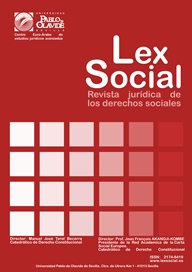Multinationals, SMEs and Non-Profit Organisations participating in the UN Global Compact
DOI:
https://doi.org/10.46661/lexsocial.5067Palabras clave:
Global Compact, The ten Principles, Worldwide impact, Sustainibility, Corporate GovernanceResumen
This paper attempts to illustrate the importance of the UN Global compact concept by examining its history and features, analysing its weaknesses and criticisms, evaluating its strengths and asking if its continuance is desirable globally. In the summing up part of the paper the conclusion is reached that the continuance of the Global Compact is essential.
Descargas
Citas
BIGGE, David M., “Bring on the Bluewash. A Social Constructivist Argument against using Nike v Kasky to attack the UN Global Compact”, International Legal Perspectives, 2004.
BANDI, Nina, United Nations Global Compact: Impact on its critics, Covalence Analyst Papers 13th September 2007.
CARBY-HALL. Joseph R., The Treatment of Polish and Other A8 Economic Migrants in the European Union Member States. Bureau of the Commissioner for Civil Rights Protection of the Republic of Poland. 2008, Warsaw (two volumes) and a Polish edition (in two volumes).
CARBY-HALL. Joseph R., “The Continuing Exploitation of Economic Migrants and Other Vulnerable Workers” in CARBY-HALL. Joseph R. (Ed.), Essays on Human Rights – A Celebration of the Life of Dr Janusz Kochanowski”, Warsaw, Ius et Lex, 2014, pp. 94-134.
CARBY-HALL. Joseph R., “The Taylor Review 2017. A Critical Appreciation of a Selection of its Content.”, in CARBY-HALL. Joseph R., MELLA MÉNDEZ, Lourdes (Eds.), Labour Law and the Gig Economy: Challenges posed by the digitalisation of labour, Abingdon, Routledge, 2020.
DEVA, Surya, “Global Compact: A Critique of the United Nations ‘Public-Private’ Partnership for Promoting Corporate Citizenship”, Syracuse Journal of International Law and Communication, 2006, vol. 34, nº 1.
HORNE, Ralph, CORREIA, Joana, et al. “From Ballarat to Bankok: How can cross sectoral partnerships around the Sustainable Development Goals accelerate urban liveability”, Cities & Health Journal, 2020.
HAMILTON, Leslie., WEBSTER, Philip, The International Business Environment (4th Ed.), Oxford, Oxford University Press, 2018.
JAMES, Paul, SCERRI, Andy, “Auditing Cities through Circles of Sustainability”, in AMEN, Mark (Ed.), Cities and Global Governance, London, Routledge, 2016, pp.111-136.
JAMHOLT, Andre, 40 Years of Experience have Proven its Point: Sustainability Financing Activity Works. SDG Knowledge hub. Available in: https://sdg.iisd.org/commentary/guest-articles/40-years-of-experience-have-proven-their-point-sustainable-financing-actually-works/
KHOURY, Stefanie, Whyte, David, Corporate Human Rights Violations: Global Perspectives for Legal Action, London, Routledge, 2017.
KELL, George, Beyond Philanthropy: How Big Corporations Deal With The Issue Of Sustainability, 6th December 2018. Available in: https://www.generali.com/info/discovering-generali/all/2018/Beyond-philanthropy
KELL, George, “Global Compact: Corporate Engagements at the United Nations”, Great Transition Initiative, February 2006.
KNIGHT, Graham, SMITH, Jackie, “The Global Compact and its Critics: Activism, Power Relations and Corporate Social Responsibility”, in LEATHERMAN, Janie (Ed.), Discipline and Punishment in Global Politics, New York, Palgrave Macmillan, 2008.
MELLA MÉNDEZ, Lourdes (Ed.), Regulating the Platform Economy: International Perspectives on New Forms of Work, (with the complete editorial participation of CARBY-HALL Joseph R.) Abingdon, Routledge, 2020.
MURPHY, Sean D., “Taking Multinational Codes of Conduct to the Next Level” Columbia Journal of Transnational Law, 2005, vol. 34, nº 2.
NEGISHI, Kanako, “A Comparative Study of the Delisting Ratings of Firms from the United Nations Global Compact in the International Management Environment”, Journal of Robotics, Networking and Artificial Life, 2018, vol. 5, nº 1.
NOLAN, Justine, “The United Nations Global Compact with Business: Hindering of Protecting the Protection of Human Rights”, University of Queensland Law Journal, 2005, vol. 24, nº 2.
RASCHE, Andreas, “A ‘Necessary Supplement’ What the United Nations Global Compact Is and Is not”, Business and Society, 2009, vol. 48, nº 4.
RIZVI, Haider, UN Pact with Business Lacks Accountability, Global Policy Forum, June 2004. Available in: https://www.globalpolicy.org/component/content/article/225/32254.html
RUGGIE, John Gerard, “Trade Sustainability and Global Governance”, Columbia Journal of Environmental Law, 2002, vol. 27, nº 2.
SCERRI, Andy, JAMES, Paul, “Communities of Citizens and ‘Indicators’ of Sustainability”, Community Development Journal, 2010, vol. 45, nº 2.
SCERRI, Andy, JAMES, Paul, “Accounting for Sustainability: Combining qualitative and quantitative Research in Developing ‘indicators’ of Sustainability”, International Journal of Social Research Methodology, 2009, vol. 13, n. 1, pp. 41-53
THÉRIEN, Jean-Philippe, POLUIOT. Vincent, “The Global Compact: Shifting the Politics of International Developments”, Global Governance, 2006, vol. 12, nº 1.
TIINA, Mylly, Work with a local network to advance peace. Source: unglobalcompact.org/un-global-compact
ZAMMIT, Ann, UTTING, Peter, Beyond Pragmatism: Appraising Business Partnerships, UNRISD, 2006. Source: http://www.unrisd.org/UNRISD/website/document,nsf/ab82a6805797760f80256b4f005da1ab/225508544695e8f3c12572300038ed22/$FILE/uttzam.pdf
ZAHARY, Patrick Watne, “What types of US companies join the United Nations Global Compact? An Empirical Analysis of Voluntary Initiative Engagement and New Moral market Place Approaches”, M.A. dissertation. Colorado State University, 2010.
Descargas
Publicado
Cómo citar
Número
Sección
Licencia

Esta obra está bajo una licencia internacional Creative Commons Atribución-NoComercial-SinDerivadas 4.0.
-
Atribución — Usted debe dar crédito de manera adecuada, brindar un enlace a la licencia, e indicar si se han realizado cambios. Puede hacerlo en cualquier forma razonable, pero no de forma tal que sugiera que usted o su uso tienen el apoyo de la licenciante.
-
NoComercial — Usted no puede hacer uso del material con propósitos comerciales.
-
CompartirIgual — Si remezcla, transforma o crea a partir del material, deberá difundir sus contribuciones bajo la misma licencia que el original.


 Lex Social
Lex Social

 @lexrevista.bsky.social
@lexrevista.bsky.social


